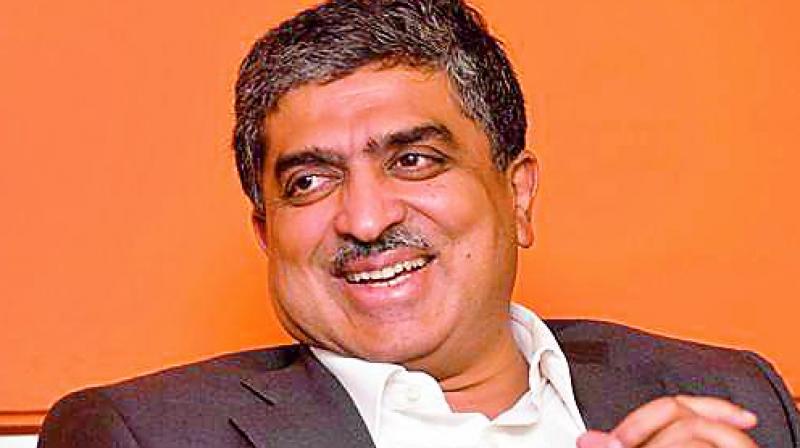Q2 results and Nandan Nilekani's new strategy today
Nandan recognises the market for what it is and align expectations with realistic goals.

Bengaluru: Will Nandan Nilekani, the new non-executive chairman of Infosys, reveal his new strategy Tuesday when he announces the firm’s Q2 numbers? Nilekani has been working on the company’s new direction in the last couple of months since his re-entry.
Digital will be a key factor in Nilekani’s new strategy and Infosys has no choice but to continue to invest in this space, says Peter Bendor-Samuel, CEO of Dallas-based Everest Group.
"To give you some background facts,’’ explains Samuel, “the digital portion of the market is growing at 20 per cent while the legacy arbitrage portion of the market shrank by 2.8 per cent last quarter. This presents Infosys with two separate markets, and two distinct strategies. First, they must participate in the digital segment; this was Vishal (Sikka)’s strategy and Nandan has no choice but to continue to invest against this. Without digital there is no long-term future. "
"At the same time, there is an opportunity to consolidate the arbitrage market. Vishal steered away from this and Nandan may choose to redirect some resources to ensure that Infosys is a market consolidator. To do this he must ensure that Infosys services are priced at or below market. (This is something Vishal also did.)’’ the Everest Group chief said.
"A more unlikely strategy is that Infosys start to acquire some arbitrage competitors. This latter move will be hard to sell to the board but is likely to be the fastest way to build value,’’ the Everest Group chief told Financial Chronicle.
“I am not sure that Nandan has much choice, given the industry’s turn towards digital,’’ he said.
Whatever Nandan does, he faces many key choices. The first is of pricing. Under Vishal Sikka, Infosys rejected the premium pricing strategy and became a price challenger. The market has made it clear that it is unwilling to pay Infosys a pricing premium. “If Nandan tries to reverse this we anticipate that growth will stop and Infosys may face a shrinking book of business. However, founders of the company seem want to return to the premium strategy. I hope Nandan will see off this pressure and keep the aggressive pricing,’’ said Samuel.
Sikka made a critical error in promising to maintain high margins. Given the immaturity of the new digital model and the structural differences it seems very unlikely that it will be possible for Infosys to keep the same industry leading margins that it enjoys in the arbitrage business in its new digital business as well, he said.
''If Nandan attempts to keep margins high, Infosys will likely fail in their attempt to grow fast in the digital segment. Compounding this problem is the ongoing downward pressure on margins in the arbitrage space. Hence, promises to the investors to keep high margins will likely create insurmountable headwinds. Having said this, I think it will be very hard for Nandan to challenge the investors and lower expectations on margins.’’
On the acquisition front, if Infosys is going to be successful in either consolidating the arbitrage market or growing in the digital market it must change its posture on acquisitions. The company requires an aggressive inorganic strategy essential for it to outperform in the digital market. In the consolidation of the arbitrage market, a selective acquisition strategy would greatly aid Infosys at becoming a winner in the upcoming industry consolidation. ''Having said all this, I think Nandan faces an uphill battle to both convince the board and Infosys management of the acquisition imperative. Even if he does get the stakeholders behind him, executing these strategies will be hard as Vishal demonstrated when he tried to accelerate the digital acquisitions,’’ he said.
“I think Nandan faces a difficult uphill battle to both heal internal stakeholder wounds while dealing with a rapidly changing market place. This journey will be long and hard and will involve overcoming numerous obstacles. The first step is to set a realistic set of objectives, this will be hard to do as investors, management and customers are all in very different places regarding expectations. Expectations on margins must be lowered, expectations on growth must be realistic, expectations on the amount of investment in IP must be increased, the capital for acquisitions must be dramatically increased. Finally, the new leadership must be given time to execute. All of this will be hard and will take every ounce of leadership Nandan has to offer,’’ said Samuel.
By EverestGroup observation, a key problem with Infosys governance in the past has been a naïve view of the changing marketplace and the place customers accord to the company. Hence, promises were extracted, and promises were made, which caused Infosys to fail against its promises and lose credibility with its investors. This resulted in some flawed strategies which inevitably led Infosys to the current crisis. It will be interesting to see if
Nandan recognises the market for what it is and align expectations with realistic goals. If he fails at this, the company will face a similar crisis in a year or two.
“It is also critical that Nandan must find a way to reduce the influence of founders. No future CEO will be able to stand against the whisper campaign, like the one that was launched against Vishal,” said Samuel.

